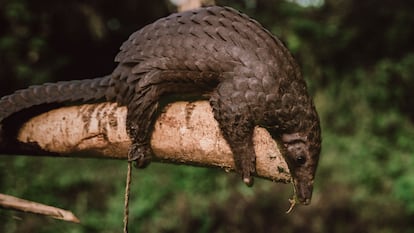Saving the pangolin: A global battle against organized environmental crime
Trafficking of this endangered species may seem like a marginal issue to some. It isn’t. It’s a high-level criminal activity

On the less visible yet no less critical front in the fight against transnational crime, a recent development stands out — one that some may call “minor,” but which is in fact, highly significant: the seizure of 1,850 pounds (840 kilograms) of pangolin scales. This represents a major blow to one of the world’s most lucrative and brutal illegal wildlife trafficking networks on the planet.
I have the privilege of being a member of the Wildlife Justice Commission, an international NGO dedicated to advancing law enforcement efforts to protect species threatened with extinction due to poaching and illegal trafficking. Experience shows that the best outcomes arise when international oversight is coordinated with national police and security forces.
Interconnected realities
This successful operation not only delivers a severe blow to the international mafias profiting from biodiversity, but also exposes three interconnected realities: Nigeria’s role as a logistical hub for crime, the insatiable Asian demand for pangolin-derived products, and, fortunately, the strengthening of international collaboration to protect species on the brink of extinction.
Nigeria, epicenter of illegal trafficking
Over the past decade, Nigeria has become one of the main transit hubs for pangolin scales, even though these mammals — unique worldwide for their keratin armor — do not inhabit the country in quantities corresponding to the volume confiscated. The scales arrive from the forests of Central and West Africa and are then shipped from Lagos ports to Asian markets, especially China and Vietnam.
Between 2016 and 2022, over 60 tons of pangolin scales were seized on Nigerian soil, just the tip of the iceberg of a clandestine trade worth hundreds of millions of dollars. Ports like Apapa and Tin Can Island have repeatedly been scenes of large-scale seizures of scales hidden in shipments falsely declared as cashews or scrap metal. Criminal networks operating to and from Nigeria exploit customs corruption, weak regulations, and lack of controls.
Asia: Tradition, luxury and black market
Although international trade in pangolin products has been completely banned since 2017 — following their listing in Appendix I of CITES — demand remains strong.
In much of Asia, especially China and Vietnam, pangolin scales are believed, without any scientific basis, to have healing properties. They are prescribed in traditional medicine to treat everything from arthritis to reproductive disorders. These products have also gained a luxury status, serving as symbols of economic power.
The result is a criminal supply chain spanning multiple continents. Traffickers use sophisticated routes, merchandise laundering systems, and networks of complicity that include corrupt officials. Every confiscated scale tells a story of animal death, but also of human impunity.
The seizure: A milestone and an opportunity
Major seizures have a multiplying effect: they deter, raise awareness, and, above all, provide key evidence for broader investigations. It’s not just about what is prevented from being trafficked today, but what can be stopped tomorrow through strategic intelligence.
The confiscation of 1,850 pounds — equivalent to thousands of slaughtered pangolins — is no minor case. Its scale reveals the operations of a well-structured, transnational criminal network. But even more importantly, it opens a window of opportunity. Authorities, given political will and police and judicial cooperation, can unravel trafficking routes, identify financiers, and apprehend the leaders of these organizations. This is a battle that admits no truce.
The recent seizure is a victory, but also a warning. As long as shipments of this magnitude continue to be intercepted, it’s clear we are far from winning the war. The pangolin — the most trafficked mammal in the world — is at risk of disappearing. And with it, a vital part of the ecological balance that sustains our lives is also at risk. It’s not enough to celebrate blows against smuggling. It’s time to maintain a global, coordinated, and ongoing offensive against environmental crime. Because defending the pangolin ultimately means defending ourselves.
The strength of international cooperation
This successful operation would not have been possible without the coordination of international organizations, law enforcement agencies, and specialized NGOs. Initiatives such as Operation Thunderstorm, coordinated by INTERPOL and the WCO, and the joint efforts of UNODC, USAID, and local entities, are proving that cooperation yields results. In Nigeria, technical support from organizations such as the Wildlife Conservation Society and the African Wildlife Foundation has played a decisive role. Furthermore, growing collaboration with agencies in Vietnam and China is vital, as without curbing demand in destination countries, any containment at the source will fall short.
High-level crimes
Pangolin trafficking may seem to some like a marginal issue. It isn’t. It’s a high-level criminal activity linked to drug trafficking networks, money laundering, and systemic corruption. Protecting the pangolin also means protecting good governance, transparency, and the rule of law in vulnerable regions. The international community must redouble its efforts. Greater political pressure, harsher penalties, and campaigns to debunk myths about the supposed healing properties of pangolin scales are needed. Unless demand decreases, no border will stop it.
Sign up for our weekly newsletter to get more English-language news coverage from EL PAÍS USA Edition
Tu suscripción se está usando en otro dispositivo
¿Quieres añadir otro usuario a tu suscripción?
Si continúas leyendo en este dispositivo, no se podrá leer en el otro.
FlechaTu suscripción se está usando en otro dispositivo y solo puedes acceder a EL PAÍS desde un dispositivo a la vez.
Si quieres compartir tu cuenta, cambia tu suscripción a la modalidad Premium, así podrás añadir otro usuario. Cada uno accederá con su propia cuenta de email, lo que os permitirá personalizar vuestra experiencia en EL PAÍS.
¿Tienes una suscripción de empresa? Accede aquí para contratar más cuentas.
En el caso de no saber quién está usando tu cuenta, te recomendamos cambiar tu contraseña aquí.
Si decides continuar compartiendo tu cuenta, este mensaje se mostrará en tu dispositivo y en el de la otra persona que está usando tu cuenta de forma indefinida, afectando a tu experiencia de lectura. Puedes consultar aquí los términos y condiciones de la suscripción digital.









































